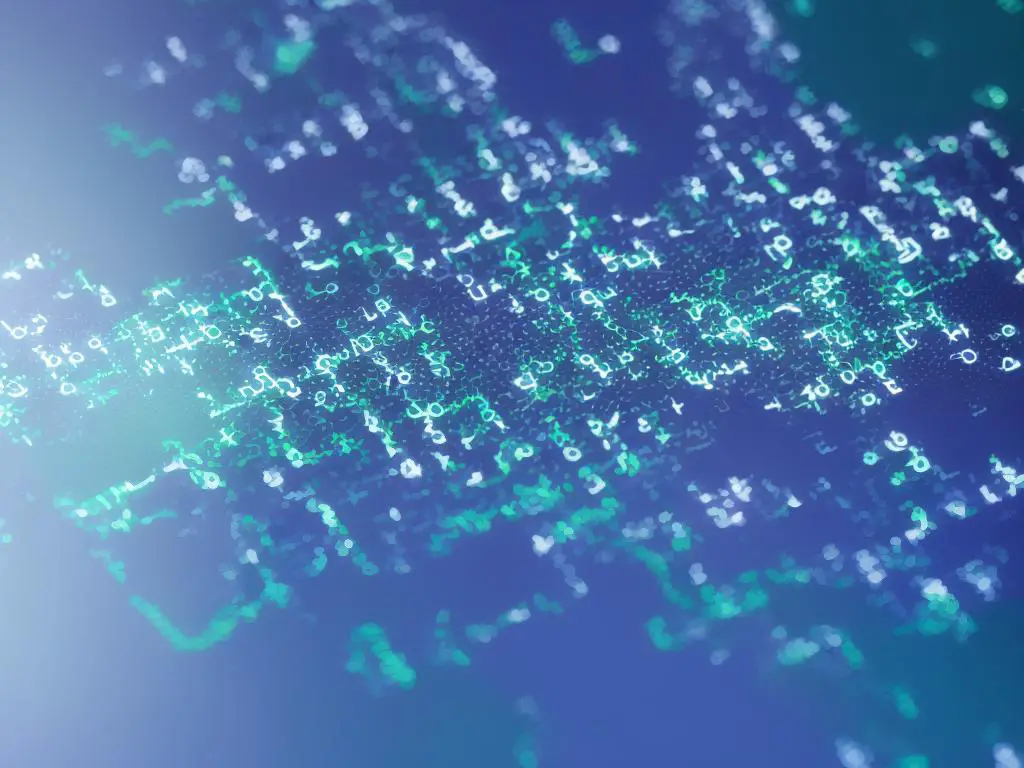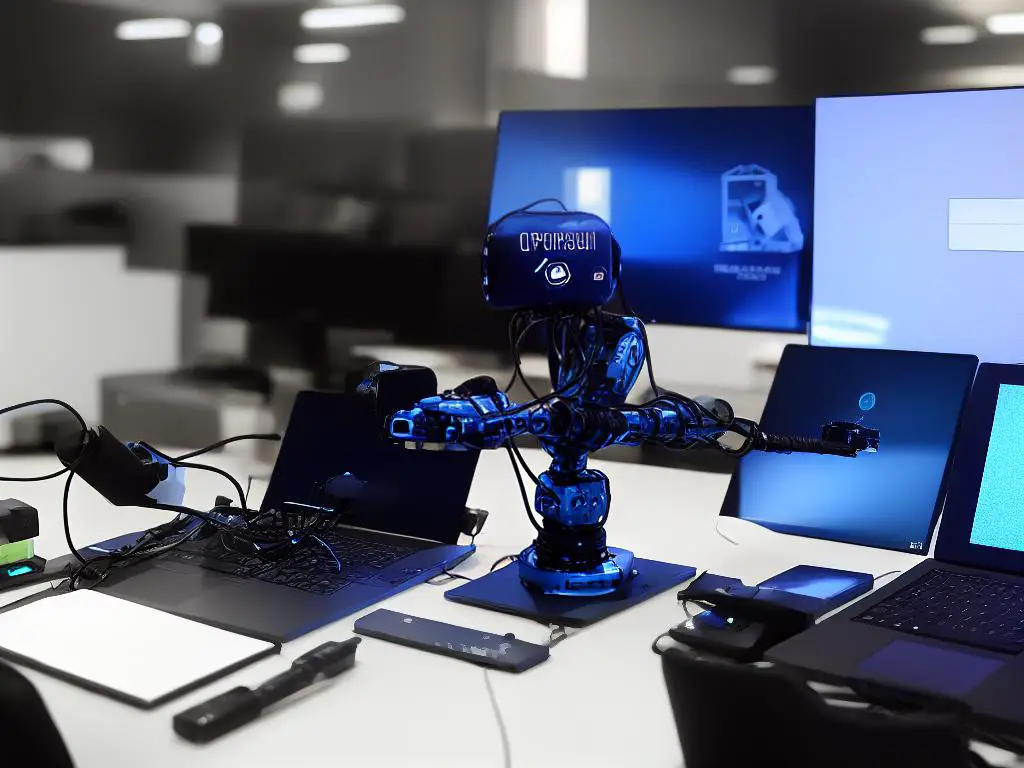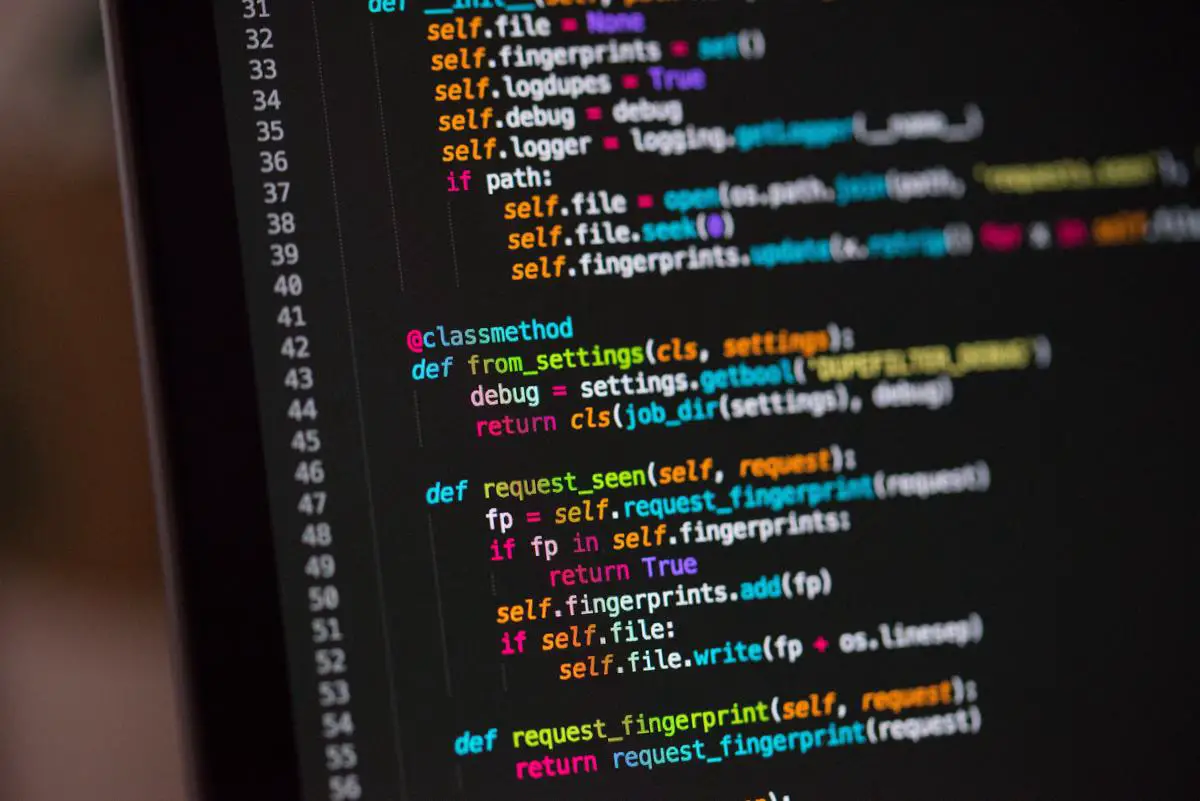In a digital era where Artificial Intelligence and open-source platforms are transforming the way we innovate, understanding the function and impact of significant collaborations such as OpenAI and GitHub is critical. This exploration delves deep into the individual roles of OpenAI and GitHub, shedding light on their unique missions, operational frameworks, and their influence within the AI and developer communities.
Crucial to this discourse is a close examination of their synergy, the technological intersections, the advantages for end-users, and the strategic motivations that undergird this collaboration. By delving into the successful integration of OpenAI’s sophisticated models onto GitHub’s platform, this narrative paints a clear picture not just for the technologically-inclined but for all interested in this groundbreaking partnership.
Understanding OpenAI and GitHub
Table of Contents
- 1 Understanding OpenAI and GitHub
- 1.0.1 Understanding OpenAI: A Pioneering AI Research Lab
- 1.0.2 Introducing GitHub: A Haven for Developers
- 1.0.3 Collaboration of OpenAI and GitHub: An AI Infused Future
- 1.0.4 The Revolutionary Impact of OpenAI-GitHub Collaboration
- 1.0.5 OpenAI and GitHub: Pioneering an Evolution in AI and Coding Collaboration
- 2 The Nature of Collaboration
- 2.0.1 Decoding the Collaboration Between OpenAI and GitHub
- 2.0.2 Purpose of Collaboration
- 2.0.3 Why OpenAI and GitHub Elected to Collaborate
- 2.0.4 Anticipated Benefits of Copilot
- 2.0.5 Collaboration Influence on Copilot’s Development and Implementation
- 2.0.6 Unlocking the Future of AI in Coding and Software Development
- 3 Technical Aspects of the Partnership
- 4 Potential Impact on the Developer Community
- 5 Future Implications for AI and Development Work
Understanding OpenAI: A Pioneering AI Research Lab
OpenAI first emerged on the scene in December 2015 as a non-profit, artificial intelligence (AI) research lab. Its primary mission is to ensure that artificial general intelligence (AGI) benefits all of humanity. Leveraging collaboration and partnerships, OpenAI seeks to build safe and beneficial AGI directly, but it is also committed to aid others in achieving this outcome.
Contrary to task-specific AI, AGI refers to highly autonomous systems that can perform any intellectual task that a human being can. OpenAI prioritizes making AGI safe and driving the broad adoption of its safety research across the AI community.
The lab uses a cooperative orientation, intending to actively cooperate with other research and policy institutions. It fosters a global community to address AGI’s global challenges. OpenAI is committed to providing public goods, helping society navigate effectively to the path of AGI.
Introducing GitHub: A Haven for Developers
GitHub, on the other hand, is a web-based hosting service for version control and collaboration. It allows developers to work together on their projects from anywhere in the world. Built on Git, an open-source version control system invented by Linus Torvalds, GitHub is an integral part of many tech professionals’ toolkit.
GitHub’s mission is to facilitate collaboration, create better software, and advance human progress. It streamlines software development and encourages collaborative efforts by building strong teams and promoting transparent leadership and flexible work.
Collaboration of OpenAI and GitHub: An AI Infused Future
The collaboration between OpenAI and GitHub is a powerful synergy that combines OpenAI’s leading-edge AGI with GitHub’s expansive developer platform. This collaboration unveiled ‘Copilot,’ a new tool that uses artificial intelligence to offer suggestions to developers while coding.
OpenAI’s machine learning system Codex is the backbone of GitHub Copilot. Trained on a multitude of public code repositories, the tool can guide developers in writing new code, coming up with solutions, and even writing an entire function independently.
The Revolutionary Impact of OpenAI-GitHub Collaboration
The emergence of Codex has revolutionized how developers work. It serves as an AI pair-programmer, offering line-by-line guidance while coding. Codex also minimizes redundancy in programming by predicting repetitive tasks, allowing developers to focus more on creativity and problem-solving.
This futuristic approach serves to democratize programming, making it more accessible to a wider audience. By using Codex, even non-programmers can get a head start in coding as the AI system can suggest optimal solutions to the user.
OpenAI and GitHub: Pioneering an Evolution in AI and Coding Collaboration
The remarkable amalgamation of OpenAI’s breakthroughs in artificial intelligence and GitHub’s influential platform carries enormous significance in modern tech society. This unique merging of AI with software development marks an unprecedented advance in the industry.
As the capabilities of AI continue to flourish, increasingly innovative collaborations are set to follow suit. The combined powerhouse of OpenAI and GitHub has ushered in a transformative tool that not only streamlines the development process but also holds the potential to reshape the future of coding and artificial intelligence.

The Nature of Collaboration
Decoding the Collaboration Between OpenAI and GitHub
This progressive partnership between OpenAI and GitHub led to the birth of Copilot, an AI-fueled peer programmer that stands to change the face of code-writing as we know it. This groundbreaking alliance sets a noteworthy milestone in the intersection of artificial intelligence and software development.
Purpose of Collaboration
The primary goal of this collaboration was to fuse OpenAI’s sophisticated capabilities and GitHub’s vast reservoir of public code, to create an intelligent tool that adapts to users’ needs and enhances their coding experience. The result was the development of Copilot, an AI assistant that suggests accurate lines or blocks of code to developers.
Why OpenAI and GitHub Elected to Collaborate
OpenAI offers primarily machine learning and AI capabilities, while GitHub is a leading platform for software development. The collaboration between the two entities allows for the seamless integration of machine learning capabilities with software development, providing enhanced usability and productivity for developers.
Anticipated Benefits of Copilot
Copilot, with the backing of AI and machine learning, assists developers in writing new code, discovering alternative ways to solve problems, and understanding complex code. It aids not only seasoned developers but also those relatively new to programming, making code writing more intuitive and less labor-intensive.
As Copilot was trained on a multitude of public repositories, it can generate code for a wide array of programming languages and tasks. It can parse context within a piece of code, enabling it to provide relevant suggestions, save time for developers, and reduce the propensity for errors.
Collaboration Influence on Copilot’s Development and Implementation
OpenAI’s contribution to Copilot is primarily its advanced machine learning models, which allow Copilot to predict and suggest the next line of code accurately. These models were trained using a dataset comprising billions of lines of code from GitHub’s public repositories. The inherent collaborative nature of this project signifies a powerful synergy between AI and coding experts, ensuring its viability and output.
GitHub’s role was to provide a platform where Copilot could be seamlessly integrated, influencing how the tool is used by developers. Since GitHub is a well-established platform used by millions of developers, Copilot has the potential to significantly impact the developer community by automating coding processes and improving overall productivity.
Unlocking the Future of AI in Coding and Software Development
The groundbreaking collaboration between OpenAI and GitHub has initiated a new era of development and integration of AI in the realm of coding and software development. This setting of a new precedent paves the way for potential partnerships across different industries, spurring discussions on insightful approaches to leverage AI for optimizing diverse industry-specific tasks and processes.

Technical Aspects of the Partnership
Delving into the Technical Aspects of the OpenAI-GitHub Partnership
OpenAI, an esteemed entity in the AI landscape, has strategically allied with GitHub, a foremost platform for developers. This innovative alliance aims to revolutionize automated programming support. Central to their collaboration is the deployment of OpenAI’s impressive GPT-3 language model which primarily aids in heightening efficiency and precision in coding tasks.
The Role of GPT-3 in the Collaboration
OpenAI’s GPT-3 (Generative Pre-trained Transformer 3) is an AI model that uses machine learning to produce human-like text. The model has the ability to understand and respond to certain inputs, which is the technology behind artificial intelligence chatbots.
On a strategic level, this partnership enables GPT-3’s application on GitHub’s platform. The language model can be used to assist developers by returning logical code outputs in response to their prompts on the platform. One of the innovative applications under this collaboration is GitHub Copilot, an AI-powered code assistant that leverages GPT-3’s capabilities.
Technical Prerequisites of the Integration
While the integration seems seamless from the outside, it is underpinned by numerous technological prerequisites.
- Infrastructure Stability: A stable, scalable, and reliable computational structure is needed to support the deployment of OpenAI’s models on GitHub’s platform. This guarantees the high performance of the AI model while managing multiple interactions from users in real-time.
- Data Security: Handling and processing code input from various users require implementation of robust data security measures. The combined platform follows stringent protocols to manage data privacy and ensure the protection of the user’s proprietary information.
- Fine-tuning of GPT-3: GPT-3’s ability to learn from examples makes it a perfect fit for GitHub, a platform teeming with billions of lines of code. Nevertheless, GPT-3 had to be specifically fine-tuned for this collaboration, teaching it to generate appropriate code based on certain text input.
Challenges and Resolutions
While the joining of these two tech giants has created exciting opportunities, it hasn’t been without its challenges. One obstacle was adapting GPT-3’s performance to handle the wide variety of programming languages hosted on GitHub. The teams had to ensure that the model could not only generate accurate code in multiple languages but also could do so in a way that conforms to the functional and stylistic requirements of each language.
Another challenge was the proper handling of potentially sensitive data. However, OpenAI and GitHub devised stringent data usage policies to ensure the anonymization of data, its secure storage, and disposal. This resolved data security and privacy considerations, ensuring user data remains confidential and safe.
Conclusion
In wrapping up, the bond between OpenAI and GitHub is an exceptional blend of breakthrough AI technology and solid technical frameworks. Despite facing challenges with system compatibility and data security, strategic planning and robust protocols have effectively mitigated these concerns. This powerful alliance is influencing the future trajectory of automated programming, prompting an industry-wide shift in how code is generated.

Potential Impact on the Developer Community
Implications for the Developer Community: Productivity Boost and Simplified Debugging
The partnership between OpenAI and GitHub points toward a remarkable change in the software development landscape. The aim of this collaboration is to leverage OpenAI’s GPT-3 model within GitHub’s coding environment—a move set to redefine how developers produce code.
The integration of OpenAI’s advanced language model has the potential to significantly boost productivity. GPT-3’s ability to generate human-like text, coupled with its proficiency in understanding programming languages, makes it a valuable assistant in code development. It aids in code writing, error detection, and offering useful substitutes. Developers especially stand to benefit from the code autocomplete feature, which not only expedites the coding process but also aids in eliminating minor typos or syntax errors.
In efforts to streamline the debugging process, the collaboration is utilizing OpenAI’s model to provide practical solutions. Debugging, a task that often entails sifting through extensive logs of code, can be notably tedious and time-consuming. With OpenAI’s model, GitHub can revolutionize this task by suggesting potential error points and identifying unusual code patterns.
Beyond that, the partnership also aims to level up user experience. Thanks to GPT-3’s prowess in understanding user needs and predicting their actions, the duo can develop dynamic tools that adapt to individual coding styles. This would result in a more intuitive, user-friendly coding experience on GitHub.
Potential Criticisms & Concerns
With the above advantages, there are also potential criticisms or concerns that might arise due to the collaboration. A primary concern that might emerge within the developer community is the fear of job replacement by artificial intelligence. As OpenAI’s GPT-3 handles some of the fundamental aspects of coding, there is a fear that it might replace the need for humans in these roles.
Another potential criticism relates to code quality. While GPT-3 may be proficient at spotting errors, it’s uncertain whether it has the ability to write optimal code. This concern is especially relevant in complex coding tasks where human expertise and ingenuity play a huge role. Can a machine learning model deliver the same level of quality, especially when coding practices differ greatly from one developer to another?
Lastly, there is a concern about the concentration of power. GitHub is already a dominant player in the code repository arena. The addition of GPT-3 further strengthens the influence GitHub has over the developer community. This concentration of influence might lead to a lack of competition, stifling innovation in the long run.
Despite potential critiques, the union between OpenAI and GitHub presents an exhilarating prospect for the future of programming.
This alliance aims to revolutionize coding by significantly boosting efficiency and enhancing the overall user experience. However, the fruits of this partnership will heavily hinge on how effectively these innovative tools are deployed, and how successfully potential challenges are navigated and resolved.
Future Implications for AI and Development Work
Mapping the Future: The Evolution of OpenAI and GitHub Cooperation
Looking out over the vast landscape of artificial intelligence (AI) and software engineering, the groundbreaking collaboration between OpenAI and GitHub, each a titan in their respective arenas, paves the way for future trends. This integration of AI into the realm of software development will profoundly shape the methodology behind AI research and coding practices in the years to come, particularly in the context of AI system development in a cooperative environment.
Driving the AI Trend Forward
The combination of OpenAI’s advanced AI research and GitHub’s extensive repository of code could propel the AI paradigm to a whole new level. With OpenAI’s algorithms learning from the immense codebase on GitHub, we are likely to witness a significant upsurge in the development of sophisticated AI models. This could fast-track AI trends towards achieving a more generalized and efficient programming assistant that can contribute to all types of code-related tasks.
Over time, this may also reshape the process of AI development work, from training new AI models to integrating them into different development environments. An open-source approach, coupled with cutting-edge AI techniques, could provide a facilitative environment for developers around the globe, thus accelerating AI’s development and evolution.
Augmenting Developer Productivity
By leveraging the strengths of both OpenAI and GitHub, this partnership could lead to substantive advancements in coding productivity. With AI-driven assistance, developers can automate routine tasks, debug code more efficiently, and enhance code reviews, all of which can significantly improve code quality and reduce development time. As a consequence of this synergy, the role of developers may evolve to manage AI co-workers and oversee project strategy, rather than spending extensive time writing code.
Shaping Future Development Work
It is also predicted that this groundbreaking collaboration could set a stage for future development work through the continuous learning process of AI from vast, diverse codebases. It could stimulate the creation of AI tools that progressively adapt with emergent coding practices and languages, thereby staying in sync with the changing landscape of programming.
Raising Potential Improvements and Innovations
The synergy between OpenAI and GitHub is ripe for producing potential improvements in existing systems and triggering further innovations. From a more refined code-autocomplete feature to the development of fully-fledged coding assistants, many solutions can emerge to revolutionize the coding process. Furthermore, with the ability to learn from the communal knowledge of the coding community, this AI can continuously improve and serve more diverse and complex functions.
Ethics, and Access to AI
Another valuable aspect could be the ethical considerations this partnership introduces. The collaboration could steer AI development towards providing access to more developers, thus mitigating the risk of AI concentration in the hands of a few. It could also address the bias inherent in AI systems by incorporating a wide range of data from diverse developers globally.
In conclusion, the partnership between OpenAI and GitHub carries substantial potential to leave a lasting impact on AI trends and future development work. From innovations in AI and coding practices to ethical considerations, the effects of this collaboration may well guide the evolution of AI and development work for years to come.
As we stand on the brink of an AI-powered future, strategic alliances such as the one between OpenAI and GitHub will continue to redefine the landscape of development work. The exploration of this partnership brings to light the transformative potential that such collaborations hold, and how they could potentially steer the evolution of productivity, debugging, and user experience.
However, while we revel in these possibilities, it’s crucial to reflect on potential criticisms and always aim for ethical, inclusive AI application. As we foresee a future enhanced by AI tech, it’s exciting to ponder the new frontier of possibilities in AI trends and development work, while also being cognizant of the challenges that may arise on this journey of constant innovation.

I’m Dave, a passionate advocate and follower of all things AI. I am captivated by the marvels of artificial intelligence and how it continues to revolutionize our world every single day.
My fascination extends across the entire AI spectrum, but I have a special place in my heart for AgentGPT and AutoGPT. I am consistently amazed by the power and versatility of these tools, and I believe they hold the key to transforming how we interact with information and each other.
As I continue my journey in the vast world of AI, I look forward to exploring the ever-evolving capabilities of these technologies and sharing my insights and learnings with all of you. So let’s dive deep into the realm of AI together, and discover the limitless possibilities it offers!
Interests: Artificial Intelligence, AgentGPT, AutoGPT, Machine Learning, Natural Language Processing, Deep Learning, Conversational AI.

